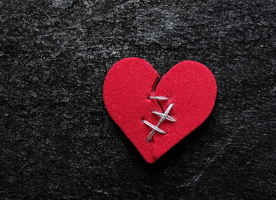The Power to Heal from Emotional & Psychological Trauma Understanding Emotional Trauma
Healing Emotional & Psychological Trauma
Healing Emotional & Psychological Trauma: What Is It and How To Heal?
Courtesy of The Sunshine Clinic

Healing Emotional & Psychological Trauma ~ Our memories make us feel certain emotions. Some memories are positive, and others may be negative. When we remember them, we either feel good or bad. If we focus on them, they can make us smile or make us cry. However, some memories affect us more seriously without our intentional focus. Severe memories that are hard to let go of may cause emotional and psychological trauma. Alarming experiences, negative emotions, or the deep pain of an unforgettable moment that lingers can sometimes affect us in what feels like an irreversible way. This is where trauma enters. Trauma is defined as a deeply distressing or disturbing experience. Those traumatic experiences in our lives are unchangeable and may affect us or keep affecting us in the future. Although we cannot undo the past, we can heal from them and know that healing is still possible.
What is Emotional and Psychological Trauma?
Emotional and psychological trauma results from extraordinarily frightening or distressful events that shatter your sense of security or make you feel helpless and can lead to challenges in functioning or usually coping afterward. In these cases, those memories repeatedly replay, and a traumatized person will have trouble controlling them. The side effects can include anxiety, feeling numb, disconnectedness, and severe trust issues towards other people. Traumatic events are not always personal physical experiences. Any experience that causes you to feel intense negative emotions can be traumatic – such as witnessing, watching, or hearing something. Deciding whether something is traumatic or not is not based on each person’s subjective emotional reaction to the event. The depth of trauma relates to the intensity of negative emotions felt about the experience. In other words, the same experience could affect different people differently. For you, it might be traumatic, but not for others. Some causes of emotional and psychological trauma:
- Unexpected events like an accident, injury, or a violent attack
- Natural disasters
- Domestic violence, emotional or physical abuse, bullying, or childhood neglect
- Continuous threats like living in a crime-ridden neighborhood or battling a life-threatening disease
Commonly overlooked causes include:
- Surgery – particularly in the first three years of life
- The sudden death of a loved one
- Severed relationships that a person has a deep emotional investment
- Humiliating or seriously disappointing experiences, most notably involving someone's deliberate cruelty
Primary involvement in an event is not necessary for trauma to occur. For example, it is highly unlikely that any of us will ever be the direct victims of a terrorist attack or a plane crash. Still, exposure to awful images on such victims' social media and news channels can create traumatic stress and overwhelm the nervous system. But the good news is, you can make healing changes and move on with life, whether the trauma happened years ago or yesterday, regardless of the cause.
Work in a 1-on-1 capacity with Dr. Rick Wallace to begin your healing process!

Childhood Trauma
Lifelong insecurities are often the result of childhood trauma and are commonly due to:
- Abuse: Sexual, physical, or emotional
- Domestic violence
- Intrusive medical procedures
- Household dysfunction, unstable or unsafe environment
- Separation from a parent
- Serious illness
- Neglect
Get your signed copy of Dr. Wallace's 20th book, Critical Mass!
Childhood experiences and interactions significantly influence the architecture of developing brains. Early experiences affect how we view ourselves and our environment, learn or cope with life’s challenges, and form relationships as adults. Positive childhood experiences contribute to healthy and productive adulthood. In contrast, negative experiences can lead to poorer mental and physical health as adults. Read more about the effects of childhood trauma here. Professional guidance from a behavioral health provider can help you find tools to overcome trust issues, make meaningful connections to others again, and regain your sense of emotional balance.
Symptoms of Emotional Trauma
In observing and reviewing responses to trauma, it is essential to remember that they are NORMAL reactions to ABNORMAL events. There is no “right” or “wrong” way to feel or react to these situations. We all think differently and have different perspectives, conditioning, and physical and emotional reactions. Emotional & psychological symptoms:
- Shock, denial, or disbelief
- Confusion, difficulty concentrating
- Anger, irritability, mood swings
- Anxiety and fear
- Guilt, shame, self-blame
- Withdrawing from others
- Feeling sad or hopeless
- Feeling disconnected or numb
Physical symptoms:
- Insomnia or nightmares
- Fatigue
- Being startled easily
- Difficulty concentrating
- Racing heartbeat
- Edginess and agitation
- Aches and pains
- Muscle tension
Ways to Heal from Emotional Trauma
Healing from psychological and emotional trauma is an individual experience. What works for one person may not for another. Below are options that may help you move towards healing, but the path is certainly not the same for everyone. If you feel lost or overwhelmed by an experience or event, professional guidance from a behavioral health provider may help you find your way.
Movement and Exercise
As trauma disrupts your body’s natural equilibrium, exercise and movement can help repair your nervous system. Exercising for half an hour or more helps improve physical and emotional well-being. It does not have to be all at once, either. A few 10-minute exercise sessions throughout the day are just as good. Rhythmic exercises that involve both your arms and legs are the best. Add a mindfulness element by focusing on your body movements while doing exercises such as rock climbing, boxing, weight training, martial arts, or yoga. This is a great way to divert your attention from negative thoughts. Focus on your body, how it feels as you move, notice the rhythm of your breath, and feel the ground on your feet or the wind on your skin. Being intently aware of these sensations grounds you at the moment and allows you to have a greater sense of fulfillment, creating mindfulness, peace, and calm while doing productive tasks.
Connect with Others
Making a connection is also a part of healing, so go ahead and take that lunch invitation or join hobby groups to give you new and different thoughts to focus on. A healthy “me-time” is okay, but too much may not be healthy as well. If speaking with friends or family makes you uncomfortable, try seeking the help of a behavioral health provider. This is a safe environment for you to share your feelings without judgment. Counselors can help you understand your thoughts and give you advice on a better outlook. Participate in social activities. Try to pursue doing “normal” activities to divert your thoughts from traumatic memories and experiences. Reconnect with old friends and past significant relationships or make new friends. Socializing can help you feel better. Consider joining a club or taking a class to connect with people who share similar interests with you.
Ask for Support
Finding comfort with a behavioral health provider, spiritual adviser, or trusted family member can help you feel better. It is not always necessary to share details about your trauma, but we all need someone who will listen attentively without judging us. Join a support group for trauma survivors. Connecting with others who understand because they have been through the same thing can inspire you, help you feel you’re not alone, and aid in your recovery.
Volunteer
Helping others is a great way to reclaim your sense of power. Knowing that you are making other people’s lives easier in some way will give you a sense of fulfillment, lessen feelings of helplessness, and remind you of your strengths. Do not let your past hold you back from living the life you want or reaching your goals. Allow friends, family, or behavioral health providers to help you get yourself back.






